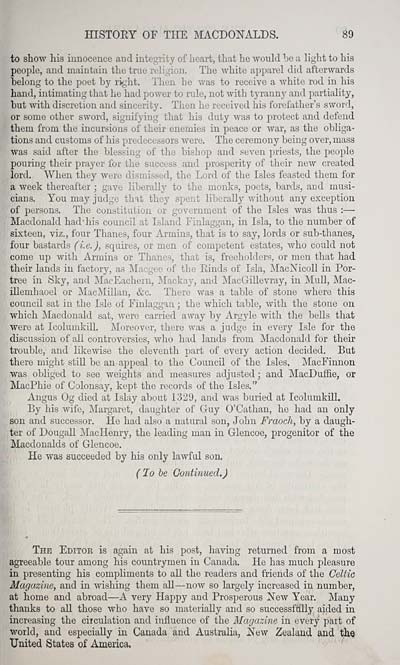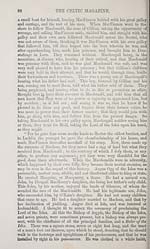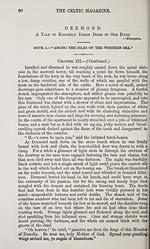Blair Collection > Celtic magazine > Volume 5
(99)
Download files
Complete book:
Individual page:
Thumbnail gallery: Grid view | List view

HISTOEY OF THE MACDO]S"ALDS. 89
to show his innocence and integrity of heart, that he -would be a light to his
people, and maintain the true religion. The white apparel did afterwards
belong to the poet by right. Then he was to receive a white rod in his
hand, intimatmg that he had power to rule, not with tyranny and partiality,
but with discretion and sincerity. Then he received his forefather's sword,
or some other sword, signifying that his duty was to j)rotect and defend
them from the incursions of their enemies in peace or war, as the obliga-
tions and customs of his predecessors were. The ceremony being over, mass
was said after the blessing of the bishop and seven priests, the people
pouring their prayer for the success and prosperity of their new created
lord. When they were dismissed, the Lord of the Isles feasted them for
a week thereafter ; gave liberally to the monks, poets, bards, and musi-
cians. You may judge that they spent liberally without any exception
of persons. The constitution or government of the Isles was thus : —
Macdonald had 'his council at Island Finlaggan, in Isla, to the number of
sixteen, viz., four Thanes, four Armins, that is to say, lords or sub-thanes,
four bastards (i.e.), squires, or men of competent estates, who could not
come up with Armins or Thanes, that is, freeholders, or men that had
their lands in factory, as Macgee of the Einds of Isla, MacNicoll in Por-
tree in Sky, and MacEachern, Mackay, and MacGillevi-ay, in Mull, Mac-
illemhaoel or MacMillan, &c. There was a table of stone where this
council sat in the Isle of Einlaggan ; the which table, with the stone on
which Macdonald sat, were carried away by Argyle with the bells that
were at IcolumkiU. Moreover, there was a judge in every Isle for the
discussion of all controversies, who had lands from Macdonald for their
trouble, and lilcewise the eleventh part of every action decided. But
there might still be an appeal to the Council of the Isles, MacFinnon
was obliged to see weights and measures adjusted ; and MacDufl&e, or
MacPhie of Colonsay, kept the records of the Isles."
Angus Og died at Islay about 1329, and was buried at IcolumkiU.
By his wife, Margaret, daughter of Guy O'Cathan, he had an only
son and successor. He had also a natural son, John Fraoch, by a daugh-
ter of Dougall MacHenry, the leading man in Glencoe, progenitor of the
Macdonalds of Glencoe.
He was succeeded by his only lawful son.
{lo he Continued.)
The Editor is again at his post, having returned from a most
agreeable tour among his countrymen in Canada. He has much pleasure
in presenting his compliments to all the readers and friends of the Celtic
Magazine, and in wishing them aU — now so largely increased in number,
at home and abroad — A very Happy and Prosperous New Year. Many
thanks to all those who have so materially and so successfully aided in
increasing the circulation and influence of the Magazine in every part of
world, and especially in Canada and Australia, ifew Zealand and the
United States of America.
to show his innocence and integrity of heart, that he -would be a light to his
people, and maintain the true religion. The white apparel did afterwards
belong to the poet by right. Then he was to receive a white rod in his
hand, intimatmg that he had power to rule, not with tyranny and partiality,
but with discretion and sincerity. Then he received his forefather's sword,
or some other sword, signifying that his duty was to j)rotect and defend
them from the incursions of their enemies in peace or war, as the obliga-
tions and customs of his predecessors were. The ceremony being over, mass
was said after the blessing of the bishop and seven priests, the people
pouring their prayer for the success and prosperity of their new created
lord. When they were dismissed, the Lord of the Isles feasted them for
a week thereafter ; gave liberally to the monks, poets, bards, and musi-
cians. You may judge that they spent liberally without any exception
of persons. The constitution or government of the Isles was thus : —
Macdonald had 'his council at Island Finlaggan, in Isla, to the number of
sixteen, viz., four Thanes, four Armins, that is to say, lords or sub-thanes,
four bastards (i.e.), squires, or men of competent estates, who could not
come up with Armins or Thanes, that is, freeholders, or men that had
their lands in factory, as Macgee of the Einds of Isla, MacNicoll in Por-
tree in Sky, and MacEachern, Mackay, and MacGillevi-ay, in Mull, Mac-
illemhaoel or MacMillan, &c. There was a table of stone where this
council sat in the Isle of Einlaggan ; the which table, with the stone on
which Macdonald sat, were carried away by Argyle with the bells that
were at IcolumkiU. Moreover, there was a judge in every Isle for the
discussion of all controversies, who had lands from Macdonald for their
trouble, and lilcewise the eleventh part of every action decided. But
there might still be an appeal to the Council of the Isles, MacFinnon
was obliged to see weights and measures adjusted ; and MacDufl&e, or
MacPhie of Colonsay, kept the records of the Isles."
Angus Og died at Islay about 1329, and was buried at IcolumkiU.
By his wife, Margaret, daughter of Guy O'Cathan, he had an only
son and successor. He had also a natural son, John Fraoch, by a daugh-
ter of Dougall MacHenry, the leading man in Glencoe, progenitor of the
Macdonalds of Glencoe.
He was succeeded by his only lawful son.
{lo he Continued.)
The Editor is again at his post, having returned from a most
agreeable tour among his countrymen in Canada. He has much pleasure
in presenting his compliments to all the readers and friends of the Celtic
Magazine, and in wishing them aU — now so largely increased in number,
at home and abroad — A very Happy and Prosperous New Year. Many
thanks to all those who have so materially and so successfully aided in
increasing the circulation and influence of the Magazine in every part of
world, and especially in Canada and Australia, ifew Zealand and the
United States of America.
Set display mode to: Large image | Transcription
Images and transcriptions on this page, including medium image downloads, may be used under the Creative Commons Attribution 4.0 International Licence unless otherwise stated. ![]()
| Early Gaelic Book Collections > Blair Collection > Celtic magazine > Volume 5 > (99) |
|---|
| Permanent URL | https://digital.nls.uk/76450141 |
|---|
| Description | Volume V, 1880. |
|---|---|
| Shelfmark | Blair.6 |
| Attribution and copyright: |
|
| Description | A selection of books from a collection of more than 500 titles, mostly on religious and literary topics. Also includes some material dealing with other Celtic languages and societies. Collection created towards the end of the 19th century by Lady Evelyn Stewart Murray. |
|---|
| Description | Selected items from five 'Special and Named Printed Collections'. Includes books in Gaelic and other Celtic languages, works about the Gaels, their languages, literature, culture and history. |
|---|

